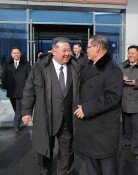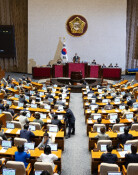Government supporting Seoul National Univ.s Quota Plan Based on Region
Government supporting Seoul National Univ.s Quota Plan Based on Region
Posted August. 20, 2002 22:09,
The discussion about region-based admission quota system will be deepened as Lee Sang-ju, Deputy Prime Minister and Minister of the Education and Human Resources Development Ministry approved of the plan made by Seoul National University President Cheong Un-chan to select freshmen by region-based quota. The Minister also announced that he would find out ways for the government to support the enforcement of the new system.
In a press meeting held on the same day, the Deputy Prime Minister said, I hinted to him my position that the new quota plan is helpful in uniting the public by reducing the gap between the rich and the poor considering the current educational situation in a meeting with President Cheong. Though it is only my private opinion, I have long considered the necessity of such a quota plan based on the region.
He also said, Education carries out two functions in society: nursing talented people and bridging the gap between the haves and have-nots. There is no problem in the University accepting about 300 freshmen by selecting one student or two per gun (administrative district) based on the quota plan. In addition, he said, If metropolitan areas such as Seoul protest against the plan, the Ministry has an intention to increase the available seats for the freshmen by the number of students to be selected by the quota system.
He noted that other national universities should follow suit and, though it is desirable for private universities like Korea University, Yonsei University and womens universities to practice such a quota system, it is up to colleges.
About 70% of freshmen at Seoul National University come from metropolitan areas and more students have parents with professional or managerial jobs, he said. Under the current educational situation, students living in educational backwaters should be compensated and, though the controversy over reverse discrimination is arising, selection of applicants with good high school records and preferential treatment to students from fishing and agrarian villages should be continued. According to the survey conducted by the University last year, students from metropolitan and large cities accounted for 77% of the total students, while those from small villages, such as eup or myeon, were only at 3.2%. Moreover, 24.8% of students parents have professional jobs as doctors or layers, and 28% of parents are company executives or have managerial jobs. Meanwhile, the rate of parents engaging in sales is only 9.7%, followed by manufacturing (8.5%), and agriculture and fisheries (3.5%). However, officials at the Education Ministry said that the Ministers saying was meant just to show his sympathy in principle, and that the increase in the limit of freshmen could be made only after the revision to related education laws and therefore it would take some time. Against this backdrop, some people say that the Education Minister went too far.
inchul@donga.com







